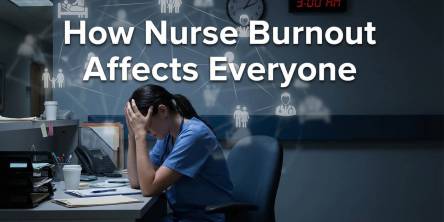When to Consider Primary Care at Home

Primary care programs can provide primary, urgent, or palliative care to patients who are medically vulnerable, often suffering from multiple chronic conditions, at home or wherever it's needed. It aims to facilitate timely interventions, potentially preventing an avoidable hospitalization or emergency room visit while also supporting the patients through loving care that lets them know they're not alone.
It's not only for the aging population but the "invisible homebound," made up of around four million people in the United States, according to the peer-reviewed journal HealthAffairs. That includes those who can't get to their primary physician's office, have severe disabilities, functional impairments, or a number of chronic conditions. Some may require end-of-life or palliative care.
Home care can allow an aging parent or another family member to receive much-needed care and support without having to move to a retirement community or assisted living facility. Of course, it's not a decision made lightly either, so you may be wondering when it's time to consider a PCH program for someone you love.
Here are a few signs that it could be time to start looking into primary care at home for your loved one.
There's Been An Increase in Falls or Other Accidents
If your loved one has been experiencing an increase in falls or other accidents, whether it's due to frailty, dizziness, or anything else, it may be time to consider a primary home program.
Falls tend to increase with age - according to a WHO Global Report on falls prevention, approximately 28 to 35 percent of those 65 years of age and older fall every year, and those figures increase among those who are 70 and older. When we're young, we can usually handle a fall without it resulting in serious issues, but the more frail one is, the greater risk of hip fracture and head trauma which can have a debilitating effect on the quality of life.
Worsening Chronic Health Issues
If your loved one has chronic health conditions like high blood pressure or diabetes, those ailments tend to worsen with age, leading to serious complications that can require immediate attention. Dementia is also something that tends to get worse as time goes on, potentially putting those who suffer from it at high risk of many different dangers. It can progress slowly, decreasing one's ability to function. As memory gradually worsens, simply taking medications accurately can become difficult and eventually impossible. Having a professional caregiver in the home can help ensure your loved one is protected.
Poor Eating Habits
If your family member is stocking up on frozen dinners, it could be a sign that he or she is turning to quick, easy meals because they don't have the energy or capability to prepare a fresh meal. Processed foods like frozen dinners may be convenient, but they can negatively impact health. You want to be sure that your loved one has access to quality, healthy meals in their own home. Having primary care at home can be an optimal way to ensure they're eating a nutritious diet that will help them stay healthy and happy.
Their Home is in Disarray
Declining health can make it difficult to keep up with household chores. If your family member has typically kept a clean house, but it's becoming dirty and cluttered, with newspapers and mail stacked up, dishes in the sink, and so on, that's a red flag that they're having difficulty keeping up with the basic maintenance of a home. It can make it harder for them to function due to disorganization and even make for unsanitary conditions that can potentially lead to illness. Fortunately, in-home primary care options can help.
Similar Articles
Winter is a season when the body needs extra nourishment, warmth, and immunity support. According to Ayurveda and modern nutrition science, dry fruits play a vital role in maintaining health during cold weather.
Most people think health problems start suddenly. One day you feel fine, the next day something is wrong. In reality, most health issues develop slowly .They grow quietly in the background while life keeps moving.
The start of a new year is a natural time to pause, reflect, and think about how you want to feel in the months ahead. For those over 60, a fresh start does not mean setting unrealistic resolutions or making drastic changes.
Picture this: You're parked at your workspace, battling to focus on what should be a straightforward five-minute task. That afternoon slump? It's demolishing you today.
Joint pain and arthritis are common health issues that tend to become more intense during the winter season
Discover the benefits, challenges, and future of locum medical jobs. Learn how locum recruitment agencies support flexible, diverse career opportunities for healthcare professionals seeking dynamic work environments.
Burnout in the healthcare environment is a significant and growing crisis.
NAD+ therapy restores cellular energy, enhances metabolism, and promotes anti-aging by supporting DNA repair and improved overall vitality.
Seasonal Affective Disorder (SAD) is a type of depression linked to seasonal changes, most commonly seen during the late fall and winter months when sunlight exposure decreases









